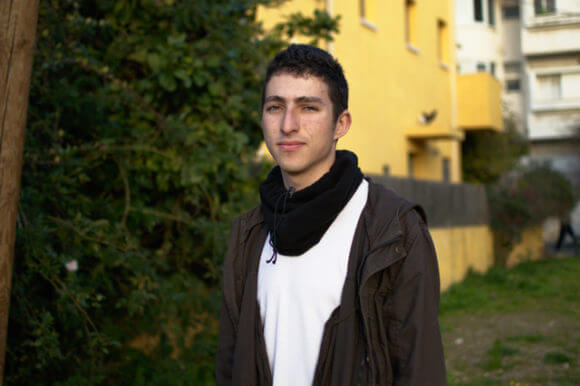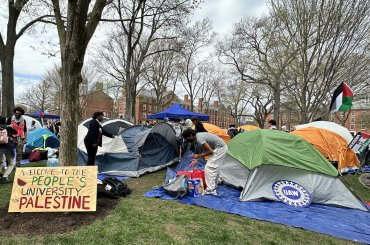On the morning of Monday February 25, Roman Levin, 19, walked to the gates of an Israeli army base where he served as a truck driver. As he approached the military transport camp north of Jerusalem, built on the lands of a Palestinian village (Beit Nabalah) destroyed in the 1948 war, he was accompanied by activists from organizations that support soldiers who refuse to serve because of political objections to Israel’s occupation, Mesarvot and Yesh Gvul.
Roman then informed his commanding officer that he was refusing to continue his military service because he did not want to be a part of “the preservation of the occupation” and the “oppression of Palestinians.” Hours later he was subjected to an “instant trial,” lasting about five minutes and sentenced to 30 days in an army detention facility, Prison Six in northern Israel.
At the end of the 30 days – on March 27 – Roman could undergo a second instant trial and be remanded to the same prison for another 30 days. There is nothing remotely resembling due process in army trials. The accused, who cannot have a lawyer or call any witnesses, is tried in the office of a commanding officer without public or media access. The army can imprison a refusing soldier for a maximum of three years.
“With the oppressors or with the oppressed?”
Roman and his family immigrated to Israel from Ukraine when he was three years old. He was raised in Bat Yam, just south of Tel Aviv. He began his military service with a sense of civic duty. In an interview for Israel’s Social TV in February, Roman explained how he came to a profound change of mind and heart after being deployed in the West Bank for over a year and a half:
“As a truck driver I traveled extensively in the occupied territories[…] There I witnessed the oppression of Palestinians. I saw how they have to wait in line for hours at checkpoints in order to go to work. I heard soldiers talk about how they raid villages at night to detain suspects. It grieves me to see how the Jews, in the past one of the most oppressed peoples, now occupy another people” (my translation from Roman’s Russian).
Roman has often traveled to the country of his birth, Ukraine, to visit relatives. He was last in Ukraine in November 2018. His observations there helped him develop his political thinking. He drew parallels between the situation in Ukraine under the current Ukrainian nationalist regime and the situation in Israel:
“I saw that Jews do not feel safe [in Ukraine]. They are seen as second-class citizens. The Russians who live in Ukraine are treated even worse. It is similar in Israel. Palestinians are not considered human.”
Roman also remarked that “in Ukraine I encountered people who disparaged me as a Jew, while in Israel I am disparaged as a Russian.”
Roman especially wants his message to reach “as many Russian-speaking people [in Israel] as possible. I want them to know that the occupation exists, that the oppression of the Palestinian people exists. In my experience most Russian-speakers do not even know that Palestinians exist. I do not want the Russian-speaking population to remain indifferent.”
He went on to tell Social TV:
“I could have requested to be transferred to another place like Haifa or Ashdod, but that would have meant shutting my eyes and ears. This would not have shown the government that there are people who oppose the occupation and that it must end. When I thought about refusal, I looked to see whether others had done it before me and on the website of the Mesarvot movement I saw that indeed that is the case – that there are others who refuse too. Then I made a final decision not to serve.
Before enlisting I did not care about politics, but now that I am a soldier and I am part of it, I have to ask myself the question: Where am I — with the oppressors or with the oppressed?”
In a statement of refusal that he handed to his commanding officer last month, Roman said:
“Currently there is a civil war going on in Ukraine, and when I visited there a few months ago, I met soldiers who did not know what they were fighting and dying for. I empathized with them because I too do not believe in the Israeli military policy – the center of which is the preservation of the occupation. This experience made me rethink the significance of my own military service.”
In addition to his prison sentence, Roman said that he is paying a heavy economic price. Again, from his refusal letter:
“Economically speaking, it is better for me and my family if I finish my service and receive the expensive truck driver license that will allow me to make a decent living when I am released, but for most Palestinians, and especially those in the Gaza strip, this is not an option. While the noose tightens around the neck of the Palestinian people, the gap between rich and poor also grows. The poverty that drains the hope for a better future from working Israelis, the government justifies with war. The state spends 70 billion [NIS] a year on the defense budget, instead of investing in education, health and welfare.”
Waving and shouting from the mountaintop
The lay of the land around the Israeli Defense Forces Prison Six gives an important advantage to protestors. Near the prison is a large hill high enough for people standing at the top – waving hands and banners, shouting and chanting – to be clearly visible and audible from inside the prison compound. So other detained soldiers, prison staff, and the refusers are all made well aware that this prisoner does not stand alone but has an active support network on the outside.
The tradition of support demonstrations on the slope opposite Prison Six was established back in 1982, when numerous reserve soldiers refused to take part in the first Israeli invasion of Lebanon. It continued in support of soldiers who refused to serve during the First Intifada and the Second Intifada. It has now been invoked on behalf of Roman. On the morning of Saturday March 9, dozens of activists climbed the mountain, calling out “Roman, Roman, we are with you!” and waving a giant banner reading, “The Refusers are the True Heroes.”
A similar protest was planned for Saturday March 16. However, on Thursday March 14 Roman was transferred to another military detention facility for soldiers accused of crimes — Prison Four, near Rishon LeTzion.



I remember – or think I remember – a phrase from Rebecca West’s “The New Meaning of Treason,” “the pleasure of conformity.” She was talking about the simple pleasure of being able to fit into the society you live in. That pleasure is not available in Israel, not for people with a conscience. It’s a pity that the kind of courage displayed by Roman Levine is required – and rare – to live a decent life in Israel.
I offer my respect to Mr. Levin for choosing morality over Zionism.